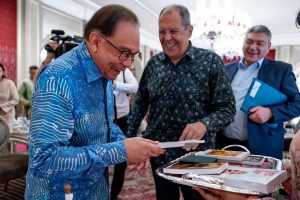On Monday, Prime Minister Anwar Ibrahim announced that Malaysia had submitted an application to Russia’s government for membership in the expanding BRICS grouping.
In a statement, Anwar’s office stated that the issue of possible BRICS membership was among the main topics of discussion during the Malaysian leader’s talks with visiting Russian Foreign Minister Sergey Lavrov, who made a two-day visit to the country that ended on Saturday.
“Malaysia has sent a letter of application to join the (BRICS) organization to Russia as the BRICS chairman, besides expressing openness to participate as a member country or strategic partner,” he said in the statement, the state news agency Bernama reported. Russia later confirmed Malaysia’s interest in joining BRICS, and said that it would “actively support” its closer relations with the grouping.
Anwar first expressed his government’s intention to join BRICS last month, ahead of a scheduled state visit by Chinese Premier Li Qiang. He later confirmed it to Brazilian President Luiz Inácio Lula da Silva. In a Facebook post on Sunday, Anwar stated that “potential membership holds substantial promise for both nations and underscores our commitment to fostering robust international collaboration.”
BRICS, which initially included Brazil, Russia, India and China, was established in 2009 as a means of advancing cooperation between so-called “emerging economies.” South Africa subsequently joined the bloc in 2010, rounding out its current acronym. The bloc has recently expanded to include Egypt, Ethiopia, Iran, and the United Arab Emirates, and there are a number of nations who are seeking to join.
While questions remain about BRICS’ cohesion, and whether it can ever form a true alternative pole to the G-7 grouping of wealthy nations, Anwar’s administration is hoping that it can yield economic benefits. In an article yesterday, the New Straits Times quoted one Malaysian academic from Universiti Teknologi Mara as saying that the bloc’s collective economic heft – the BRICS member countries account for around 28 percent of the global GDP – could “offer substantial opportunities for Malaysian businesses.”
“Sectors – such as palm oil, rubber, and electronics, where Malaysia holds a competitive advantage – could benefit significantly from increased market access to BRICS nations,” the academic said.
Perhaps more important, however, is what the membership bid says about Malaysia’s attempt to establish equidistant relations with competing strategic and economic blocs. BRICS membership would complement the nation’s membership in the formerly U.S.-led Comprehensive and Progressive Agreement for Trans-Pacific Partnership and the Regional Comprehensive Economic Partnership, both of which it has joined in an attempt to diversify its array of economic and political partnerships. It also has bilateral free trade agreements with nations including Japan, Turkey, Pakistan, and Australia.
That said, the push to enter BRICS is likely inseparable from Anwar’s skepticism about the U.S.-led “rules-based international order,” not least in relation to the Israel-Palestine conflict, and attempt to position Malaysia at the forefront of a rising cohort of Global South nations. In a Facebook post last month, Anwar hailed the shifts in global distributions of power as indicating “a move towards a truly global perspective, where diverse voices and viewpoints are increasingly recognised and respected.”
“Reflecting on the days of Zhou Enlai, Sukarno, and Nyerere during the Asia-Africa Bandung Conference in 1955, it is clear that while the world has evolved, general condescending attitudes and colonial mindsets persist,” he wrote, according to a Bernama report.
Whether or not the BRICS can be said to represent a coherent “Global South” voice – the membership and prominent position in the grouping of Russia and China certainly strain the idea that it represents anything like a coalition of the “non-aligned” – Anwar clearly views it as a means of maintaining a degree of balance in Malaysian foreign relations – and a way of augmenting his nation’s influence in international affairs.

































